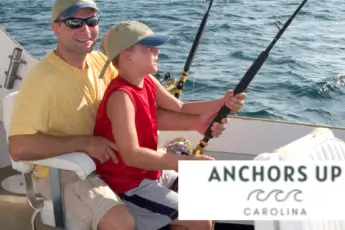Without a doubt, I have spent plenty of nights out on the water, fishing from sunset to sunrise. Most often, I was swordfishing out of Ft. Lauderdale or reef fishing in the Bahamas. Navigating and fishing in the dark is entirely different compared to the day. Determining points of reference, tuning in on boat and channel marker lights, and seeing the waters ahead of you is entirely different. Here is what you need to know for staying safe while night fishing on a boat.
Turn On Your Navigation Lights
As simple as it sounds, boaters often fail to turn on navigation lights before heading away from the dock. Importantly, you’re going to need to flip the switch for your running lights and not the anchor light.
First, failing to turn on navigation lights will not allow other boaters to spot you. Secondly, fellow boaters will have no idea which way you are headed. The operator needs to know so they can make the correct decision as to who is the give way versus the stand on vessel.
Don’t Race Out To Your Destination
I don’t enjoy wasting time running to my fishing location, but I know that during the night, I need to slow down.
Unfortunately, during the nighttime hours, you will not be able to spot floating objects ahead. With that said, pull back on the throttle and arrive at your fishing location safely.
I am fortunate to never have hit something at night. However, my friends have. In one situation, the boat struck a hard object and began taking on water. Thankfully, they were able to make it back to the dock safely.
Switch The Lights From Running To Anchor
Look, you don’t always need to turn on your anchor lights when you’re fishing at night. According to navigation laws, you are considered underway if you’re not held in position by an anchor or mooring ball.
With that said, if you’re dropping the anchor while nighttime fishing, it is imperative to flip the switch from running lights to the anchor light only. Fellow boaters will understand that you’re not in motion but instead stationary.
Keep An Eye On The Weather
During the night, especially with a new moon, it is difficult to see clouds in the sky. Importantly, you’re going to want to be on the lookout for building storms. I recommend monitoring the radar aboard your boat or on your phone.
Secondly, if you’re noticing the winds beginning to build, it may be a good idea to head back to the dock. The combination of ruff seas, low visibility, and stiff winds will make it more challenging to navigate.
Lastly, turn on the marine radio and tune into the weather station. On channel 22A, the Coast Guard broadcasts storm warnings and coastal forecasts. Alternate between the fishing station and 22A,
Don’t Go Overboard
One of the most frightening experiences is going overboard on a boat especially during the nighttime hours.
When night fishing, you’re going to have to do whatever you can to remain firmly planted on the deck of the boat.
While underway, utilize grab bars and stay central to the boat. Avoid leaning over the side or moving about the deck. Instead, remain in one position.
When fishing, again, keep yourself more towards the middle of the boat. I get it; it’s challenging to fish unless you’re within close proximity to the gunnel. However, do your best to avoid relying heavily on the gunnel for support.
Lastly, avoid leaning over the side to retrieve fishing lines and fish. Instead, use a net or gaff to bring fish over the side and into the boat. Leaning over the side can cause you to tumble overboard. Furthermore, the risk is higher when the decks are wet from either rain or sea spray.
Create A Float Plan
It is imperative that somebody on shore knows where you’re going, how many people are onboard, and when you’ll be back to the dock.
Creating a float plan when night fishing will determine when help is required if you’re not back by the scheduled time. Making a float plan will not require much time, but know that your life can be dependent on it.
Stay Safe While Night Fishing By Boat
Although it wasn’t mentioned, it goes without saying that you and your passengers should wear a life jacket. Fishing or boating during the nighttime hours is a fun experience and keeps you out of the blazing sun. I enjoy bottom fishing reefs after the sun has set. However, to stay safe, keep these tips in mind.







